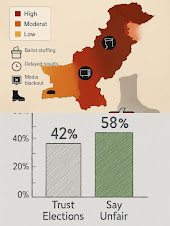Why did Pakistan’s democracy fail? A deep dive into a broken system:
“Democracy is the path to freedom.” But what happens when the road never ends?
Pakistan, since its birth in 1947, has swung like a pendulum between civilian governments and military control. While other countries have established stable democratic systems, Pakistan’s democracy seems stuck upside down like a car – making noise, but not moving forward.
"Are we in the dark ourselves,or have we been put in the dark?"
Let’s explore how and why Pakistan’s democracy failed.
- The fundamental crisis
Pakistan had no constitution for nine years after independence. It’s like starting a cricket match without rules.
Without a democratic structure, military and bureaucratic forces filled the power vacuum. Civilian institutions were too weak to resist.
- Military Intervention: The Culture of Quiet Coup
Pakistan has experienced three direct military coups (1958, 1977, 1999) and several indirect coups.
Each time, the generals promised to “save” the country – but they weakened ;
- civilian institutions
- cornered the media
- centralized power.
Military Coups in Pakistan
1. 1958: General Ayub Khan
2. 1969: General Yahya Khan
3. 1977: General Zia-ul-Haq
4. 1999: General Pervez Musharraf
These coups have significantly impacted Pakistan's politics, democracy, and stability.
Think about it: How can democracy thrive when a general can dismiss an elected prime minister?
- Weak Political Leadership
Pakistan’s political parties often revolve around personalities, not policies.
Many leaders are engaged in corruption, family politics, and vendettas(revenge) rather than working for the people.
Example: Instead of robust parliamentary debates, we often see politicians fighting like reality TV stars. Where is the vision?
- Flawed Elections and Power Games
Although Pakistan has held many elections, most are questioned for being rigged, manipulated or have been implicated by the establishment.
An “selected” prime minister is not the same as “elected”.
- 2024 election:
- PTI-backed independents:92 seats
- PML-N:75 seats
- PPP:54 seats
- 2018 election:
- PTI:114 seats
- PML-n:63 seats
- PPP:43 seats
- Lack of political education among the people
Democracy is not just about voting, it is about knowing why you are voting.
In Pakistan, many voters choose candidates based on tribe, caste or slogans – not performance or policy.
Without political awareness, democratic elections become a gamble.
- Media Control and Disinformation
A free media is a pillar of democracy, but journalists in Pakistan often face threats, restrictions or “disappearance” if they question the powerful.
Silencing the truth:journalist killings in Pakistan
1. Abdul Latif (Baloch journalist)
2. Arshad Sharif (killed in Kenya)
3. Hasnain Shah (Capital TV journalist)
4. Wali Khan Babbar (killed in Karachi)
5. Athar Mateen (killed in 2022)
6. Zia-ur-Rehman Farooqi (murdered in 2022)
Controlled narratives undermine public understanding. People buy propaganda instead of truth.
- Failure of the judiciary and accountability
In Pakistan, courts often act as puppets of those in power.
Selective justice (where only opposition leaders are arrested) erodes trust in the system. True democracy requires true justice for all, not just for the weak.
- Foreign Influence and Debt
IMF agreements, foreign aid, and American influence often shape Pakistan’s politics behind the scenes.
It’s hard to be a sovereign democratic state when your economy is controlled by foreign conditions.
Total public debt:
Rs.74 trillion(US$270 billion) As of December 2024
- The real question: Can Pakistan’s democracy be fixed?
Yes – but only if we want it to.
- Educate the public about democracy and voting rights.
- End military intervention once and for all.
- Hold all leaders equally accountable.
- Reform political parties to serve the people, not families.
- Protect freedom of the press and the independence of the judiciary.
- Final Thought:
Pakistan’s democracy did not fail overnight; it was torn apart by power struggles, greed, and silence.
But just as a broken clock can be fixed, so can democracy.
The first step? Awareness – and that’s where you come in.
- Learn to lead: The importance of political education:
In a country where most people learn politics through hearsay or biased TV shows, real political understanding is becoming a rare commodity. Yet if democracy is to survive, political education must move beyond the drawing rooms of the elite and into the minds of ordinary citizens.
But this education does not require a degree. It begins when we decide to question what we hear, when we stop taking party slogans as facts, and when we try to understand how power is exercised, not just who holds it.
Reading newspapers critically, watching parliamentary sessions instead of political battles, understanding how a bill becomes law, and knowing what the constitution actually promises are small but powerful steps.
It is not just about knowing who the prime minister is. It is about knowing what your rights are, how they can be protected, and how they are being violated.
2023 report of fair election
True political education occurs when citizens stop being passive observers and start becoming informed participants. Not to win arguments, but to defend their future.






















0 Comments